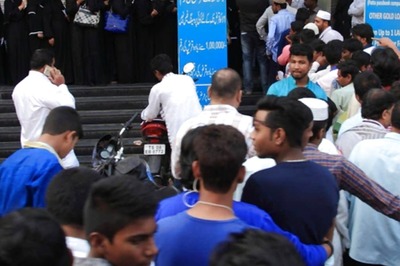
views
New Delhi: US sanctions will not be an impediment to Indo-Russia defence deals and New Delhi and Moscow could soon sign agreements on frigates and Kalashnikov assault rifles in the next few months, Russian Ambassador to India Nikolay Kudashev said on Thursday.
Describing the recently-inked USD 5.4 billion S-400 missile defence system deal as the "largest contract" in the history of Indo-Russia ties, he said it was one of the "speediest" agreements to be signed between the two countries and there were no protracted negotiations.
The implementation of the contract, signed during President Vladimir Putin's visit from October 4-5, would start in 2020 and would last for five years, he said.
"In the coming months, you can expect more deals. Talks are on, this is the normal process. We hope that within two-three months... We could soon have a deal on frigates, it is very much on the agenda of the two sides, and we could soon have a deal on the Kalashnikov assault rifles," the envoy told journalists here.
Kudashev was emphatic in saying that the US law - Countering America's Adversaries Through Sanctions Act or CAATSA - would not put pressure on India and Russia for further defence deals.
His remarks come just a day after US President Donald Trump said India would soon "find out" if the punitive CAATSA sanctions apply to it over its USD 5 billion deal with Russia to purchase the S-400 Triumf air defence system.
The CAATSA is a US federal law that imposed sanctions on Iran, North Korea and Russia. In Russia's case, the act primarily deals with sanctions on Russian interests such as its oil and gas industry, defence and security sector, and financial institutions.
Under the CAATSA sanctions, only Trump has the authority for a presidential waiver to India on weapons deal with Russia. The S-400 deal was underplayed by New Delhi, perhaps in a bid to keep its robust ties with Washington unblemished.
Prime Minister Narendra Modi and Putin, who held their annual summit, did not mention the S-400 deal in their respective press statements. Government officials also did not publicly announce the inking of the deal, with only official sources confirming it and a joint statement making a mention of the deal.
Asked about the playing down of the S-400 missile defence system deal during President Putin's visit, Kudashev said the relationship between the two countries is very close and military and technical part of it is important, but it need not be interpreted as a defining one.
"The visit was about growing connectivity politically, economically, militarily in a humanitarian way, multi- dimensional... It was not about arms race, it was not about countering CAATSA, with its own CAATSA. The agenda was unifying, it was peaceful and that is why the military and technical side was important, but was one part of the statement," he said.
On why the S-400 deal was not signed publicly, the Russian envoy said under Russian rules and protocol agreements are done before or on the sidelines of talks not necessarily in the presence of leaders, and added that may be talks were on till late.
(With PTI inputs)

















Comments
0 comment